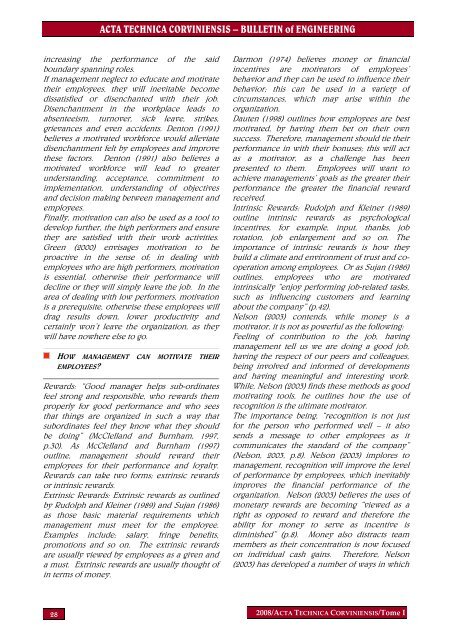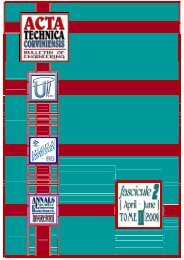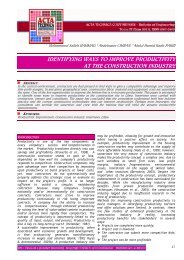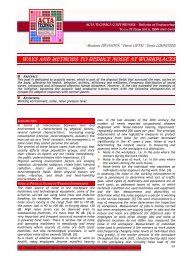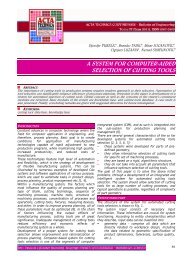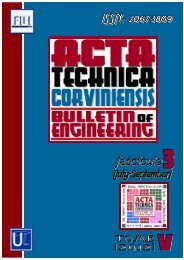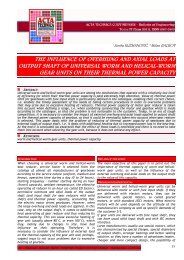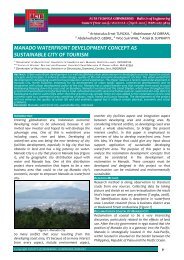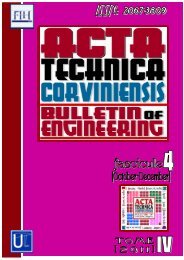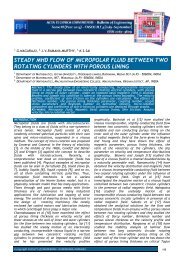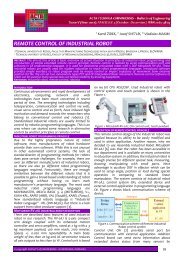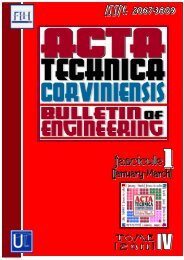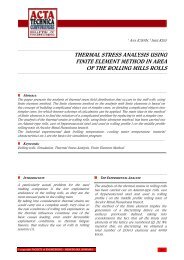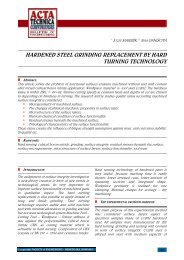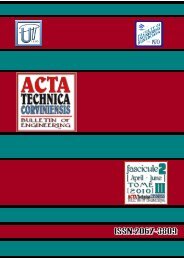Acta Technica Corviniensis
Acta Technica Corviniensis
Acta Technica Corviniensis
- No tags were found...
You also want an ePaper? Increase the reach of your titles
YUMPU automatically turns print PDFs into web optimized ePapers that Google loves.
ACTA TECHNICA CORVINIENSIS – BULLETIN of ENGINEERINGincreasing the performance of the saidboundary spanning roles.If management neglect to educate and motivatetheir employees, they will inevitable becomedissatisfied or disenchanted with their job.Disenchantment in the workplace leads toabsenteeism, turnover, sick leave, strikes,grievances and even accidents. Denton (1991)believes a motivated workforce would alleviatedisenchantment felt by employees and improvethese factors. Denton (1991) also believes amotivated workforce will lead to greaterunderstanding, acceptance, commitment toimplementation, understanding of objectivesand decision making between management andemployees.Finally, motivation can also be used as a tool todevelop further, the high performers and ensurethey are satisfied with their work activities.Green (2000) envisages motivation to beproactive in the sense of; in dealing withemployees who are high performers, motivationis essential, otherwise their performance willdecline or they will simply leave the job. In thearea of dealing with low performers, motivationis a prerequisite, otherwise these employees willdrag results down, lower productivity andcertainly won’t leave the organization, as theywill have nowhere else to go.HOW MANAGEMENT CAN MOTIVATE THEIREMPLOYEES?Rewards: “Good manager helps sub-ordinatesfeel strong and responsible, who rewards themproperly for good performance and who seesthat things are organized in such a way thatsubordinates feel they know what they shouldbe doing” (McClelland and Burnham, 1997,p.30). As McClelland and Burnham (1997)outline, management should reward theiremployees for their performance and loyalty.Rewards can take two forms; extrinsic rewardsor intrinsic rewards.Extrinsic Rewards: Extrinsic rewards as outlinedby Rudolph and Kleiner (1989) and Sujan (1986)as those basic material requirements whichmanagement must meet for the employee.Examples include; salary, fringe benefits,promotions and so on. The extrinsic rewardsare usually viewed by employees as a given anda must. Extrinsic rewards are usually thought ofin terms of money.Darmon (1974) believes money or financialincentives are motivators of employees’behavior and they can be used to influence theirbehavior; this can be used in a variety ofcircumstances, which may arise within theorganization.Dauten (1998) outlines how employees are bestmotivated, by having them bet on their ownsuccess. Therefore, management should tie theirperformance in with their bonuses; this will actas a motivator, as a challenge has beenpresented to them. Employees will want toachieve managements’ goals as the greater theirperformance the greater the financial rewardreceived.Intrinsic Rewards: Rudolph and Kleiner (1989)outline intrinsic rewards as psychologicalincentives, for example, input, thanks, jobrotation, job enlargement and so on. Theimportance of intrinsic rewards is how theybuild a climate and environment of trust and cooperationamong employees. Or as Sujan (1986)outlines, employees who are motivatedintrinsically “enjoy performing job-related tasks,such as influencing customers and learningabout the company” (p.42).Nelson (2003) contends, while money is amotivator, it is not as powerful as the following:Feeling of contribution to the job, havingmanagement tell us we are doing a good job,having the respect of our peers and colleagues,being involved and informed of developmentsand having meaningful and interesting work.While, Nelson (2003) finds these methods as goodmotivating tools, he outlines how the use ofrecognition is the ultimate motivator.The importance being, “recognition is not justfor the person who performed well – it alsosends a message to other employees as itcommunicates the standard of the company”(Nelson, 2003, p.8). Nelson (2003) implores tomanagement, recognition will improve the levelof performance by employees, which inevitablyimproves the financial performance of theorganization. Nelson (2003) believes the uses ofmonetary rewards are becoming “viewed as aright as opposed to reward and therefore theability for money to serve as incentive isdiminished” (p.8). Money also distracts teammembers as their concentration is now focusedon individual cash gains. Therefore, Nelson(2003) has developed a number of ways in which282008/ACTA TECHNICA CORVINIENSIS/Tome I


